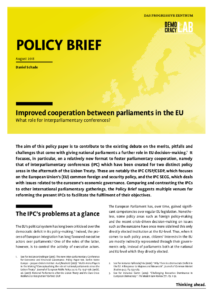The aim of this policy paper is to contribute to the existing debate on the merits, pitfalls and challenges that come with giving national parliaments a further role in EU decision-making. It focuses, in particular, on a relatively new format to foster parliamentary cooperation, namely that of interparliamentary conferences (IPC) which have been created for two distinct policy areas in the aftermath of the Lisbon Treaty. 
These are notably the IPC CFSP/CSDP, which focuses on the European Union’s (EU) common foreign and security policy, and the IPC SECG, which deals with issues related to the eurozone’s economic governance. Comparing and contrasting the IPCs to other international parliamentary gatherings, the Policy Brief suggests multiple venues for reforming the present IPCs to facilitate the fulfilment of their objectives.
You can read the whole Policy Brief here.
Daniel Schade formulated two main recommendations:
RECOMMENDATION 1: BRINGING POLITICS INTO THE IPCS
Option 1: Representation by political parties
● Recognition of the party politics behind EU policies
● Structure IPC representation and recognition around European party families
● Provide formal spaces for party family exchanges
Option 2: Make individual MPs count through committee work
● Introduction of formal committee structures and committee work into the IPCs
● Committee discussions on concrete policy issues and related texts to be adopted
● Create feedback mechanisms for their dissemination in national political processes
RECOMMENDATION 2: SMALLER PROCEDURAL CHANGES
1. Coordination of IPC meeting dates with parliamentary agendas
2. Set concrete IPC agenda items to be discussed in detail
3. Replace the conference conclusions with informal discussion summaries to avoid procedural discussions
4. Prioritise small informal and confidential discussions outside of plenary meetings
5. Establish means to link MPs from different EU countries to foster the networking character of IPCs
Daniel Schade is a visiting fellow at the Democracy Lab of Das Progressive Zentrum. He works as a researcher and lecturer on European Politics at the Otto von Guericke University Magdeburg, and an occasional lecturer at Sciences Po Paris and the Vienna School of International Studies. He holds a PhD in International Relations from the London School of Economics and Political Science (LSE). His work is concerned with EU foreign policy and the role of parliaments in the EU’s political system.

